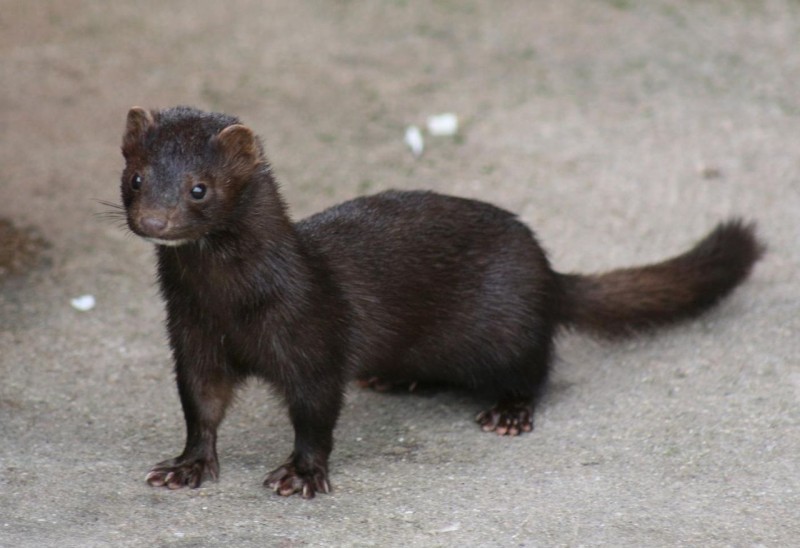article_detail
Date Published: 16/07/2020
ARCHIVED - Aragonese Government orders slaughter of 92,700 minks following Covid-positive tests
The possibility that the virus may be jumping between humans and mink has been raised in the Netherlands and Denmark where hundreds of thousands of mink have already been slaughtered.
Seven workers on the farm tested positive, since when a series of tests have confirmed that there are many cases of Covid amongst the minks on the farm
Yesterday the Ministry of Health in the Netherlands reported that it had detected another mink farm with a coronavirus outbreak, bringing the total of mink farms with cases in the Netherlands to 24, and issued an order to slaughter 4,500 animals. The Netherlands has nearly 130 mink farms and has slaughtered nearly a million animals since the Covid pandemic began.
Today a similar story has appeared in Spain, only this time the number of animals which will be sacrificed is 92,700 as questions continue to be asked about the possibility of human-mink transmission.
The possibility that the virus may be able to jump species between humans and minks was first raised in the Netherlands, the fourth largest producer of mink pelts after China, Denmark and Poland, during May, when the Dutch Government found strong similarities between the virus in a furfarm worker and in the minks on the farm, “Based on this comparison and the position of that form of the virus in the family tree, the researchers concluded that it is likely that one staff member at an infected farm has been infected by mink,” the Dutch government said in statement.
Coronavirus was first found on a mink farm in the Netherlands during April, and has since been found in at least 15 other farms.
By June 5th, nearly 600,000 mink in the Netherlands had been suffocated by carbon monoxide gas in order to help limit the spread of the virus, speeding up plans to end mink farming in the country by 2024, and since then the Dutch parliament has voted to cease mink breeding imminently and provide compensation to fur farmers. Nearly one million animals have now been slaughtered.
In Denmark at least three farms have culled their stock following outbreaks; on July 1st the Danish Veterinary and Food Administration (DVFA) announced that a third farm had been ordered to kill its stock (10,000 mink) in the Hjorring municipality of North Jutland, 356 km northwest of Copenhagen, after staff tested positive.11,000 mink were slaughtered on two other mink farms in the same area after the dog of a mink farm owner tested positive and became the first pet in Denmark infected with the coronavirus.The country has roughly 19 million mink at 1,500 fur farms.
On Thursday the Government of the Region of Aragón in Spain ordered the slaughter of 92,700 minks on a farm in La Puebla de Valverde (Teruel), after a series of tests carried out over a two month period confirmed contagion amongst the animals.
The final decision was made last night by the administrations involved after four sets of tests showed a significant spread of the virus.
The General Directorate of Food Quality and Health provisionally immobilized the farm on May 22nd, when seven of its workers tested positive for COVID-19 and since then have monitored the animals, without allowing the entry or exit of specimens or by-products of the farm.
The first tests were carried out on May 28th and following the protocol established by the Ministry of Agriculture, Fisheries and Food, a random sample of seven animals was selected and an RT-PCR test was performed at the National Reference Laboratory for the Diagnosis of Diseases in Animals of the Ministry, located in Algete (Madrid).
On June 8th, a second sampling was performed, taking 20 samples of sera and oropharyngeal swabs, rectal swabs, and exudates from internal organs, resulting in an inconclusive positive case against SARS-CoV-2, after which the Department decided to continue conducting tests in the farm.
On June 22nd, a third test was carried out in which a random sample of 30 specimens was selected.
The results confirmed five positives, equivalent to 16% of the selected sample. With this data "immobilization was fully justified", the regional minister for agriculture of the Aragón region, Joaquín Olona said in the press conference announcing the decision.
Before making a decision that would "cause serious economic damage" to the owner of the farm, the Department of Agriculture ordered a fourth sample of 90 specimens, which was carried out on July 7th.
The results, which were released on Monday, July 13th, found 78 positives, 86.67% of the sample.
After the "conclusive" results obtained, the Government of Aragon has ruled that as a preventive measure, the 92,700 minks on the farm must be slaughtered. "
"We are absolutely certain that the virus is present in these animals and community transmission between animals is taking place," stressed the minister, who has made it clear that "the sole purpose" of slaughter is "to avoid public health risks ".
The slaughter order will be executed directly by the Department of Agriculture itself, with the support of the public company SARGA and "adopting all the necessary biosecurity measures," added Olona in strict compliance with the provisions of the Animal Health Law.
"The Department of Agriculture, Livestock and Environment cannot determine if there is human-to-animal transmission or vice versa," but "there is room for both possibilities, whether it has occurred in one direction or the other," the minister said " we cannot confirm anything at the moment. "
Spain has 37 mink farms; 31 in Galicia, one in Aragón, one in the Basque Country; three in Castilla y León and one in Valencia, producing 750,000 pelts a year.
Image: American Mink.By Patrick Reijnders - Own work, CC BY-SA 3.0, https://commons.wikimedia.org/w/index.php?curid=25446155
-->
Contact Spanish News Today: Editorial 966 260 896 /
Office 968 018 268




























